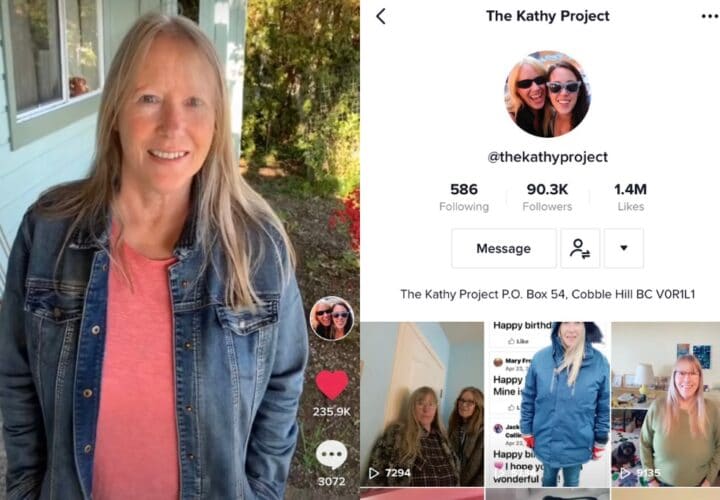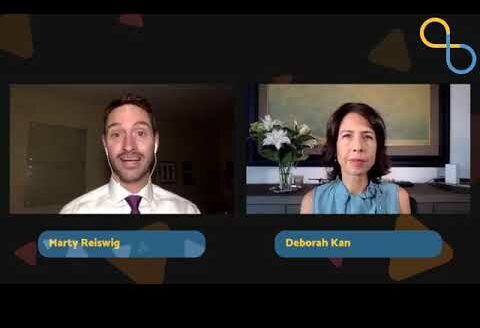The sisters behind “The Kathy Project” use TikTok to share their journey with early-onset Alzheimer’s.
Kathy and Jean Collins of British Columbia, Canada, downloaded TikTok while bored at home during lockdown and quickly became fans of the immensely popular video-sharing app. One day in May of 2020, Jean walked into her sister Kathy’s bedroom and found her surrounded by an array of Post-it Notes stuck to the wall behind her. Kathy, 59, is living with early-onset Alzheimer’s and uses these notes to remind her what to do each day. Jean, 61, found this to be a comical yet poignant sight, so she took out her phone and filmed a sixty second video of Kathy, asking her what it’s like to have early-onset Alzheimer’s. The two posted the video to TikTok — and the rest was history.
Only eight months later, Kathy and Jean’s account now known as “The Kathy Project,” has surpassed ninety thousand followers and garnered 1.4 million likes across its video library. The sisters went viral right away, receiving 1.5 million views on just the third video they posted. In it, Kathy and Jean laugh about their “highly unusual” living situation as two grown women moving into their parents’ basement. The reason behind this, of course, was to support Kathy as she faces early-onset Alzheimer’s, while in turn supporting their elderly parents.
@thekathyproject Kathy and I talking about our living situation. #dementia #earlyonsetdementia #alzheimers #livingwithparents b#foryourpage #fyp
According to Jean, it was an exhilarating feeling for her and Kathy to receive such a strong response from viewers and to reach so many people at once, which led them to think that perhaps they could do something really significant with their new platform. The sisters have grown their account with the pursuit of educating people about early-onset Alzheimer’s and showing that the disease doesn’t always need to be viewed with such negativity and fear. She told Being Patient, “A big part of Kathy’s mission is to say, ‘Hey, it’s not all bad. I’m still living my life, I’m still alive.’”
The Kathy Project has led to many meaningful connections for Kathy and Jean. For instance, one of their followers now uses videos of Kathy to train staff at a dementia care facility. Additionally, the two have had many conversations with clinicians and medical students, a few of which were inspired to specialize in dementia or geriatric care after hearing Kathy’s story. As you can imagine, it can be challenging to have hundreds of comments to read through per video. However, Jean said, “For the most part people are really sweet and kind. You can just scroll through the comments, and it’s like this shower of warm water.” She added, “Many people who have family members going through dementia are comforted when they watch Kathy who is handling this disease with such dignity and grace, and is able to stay happy, calm, and contented.”
Stuck In the Mud of Dementia
Kathy’s journey with early-onset Alzheimer’s started years ago as she began experiencing troubling symptoms. The sisters recalled that Kathy was constantly wringing her hands along with other odd repetitive behaviors as she played games like mahjong and solitaire all day long. She was frequently crying, experienced a great deal of anxiety, and seemed to lose the desire to bathe or care for herself. Initially, Kathy’s family and doctors both believed Kathy was suffering from severe mental health issues, and Kathy was prescribed medication for depression. However, as Kathy started exhibiting clear memory impairments it became evident that something else was wrong. Eventually, Kathy received an official diagnosis at the age of 57, which brought her an immense sense of relief as she finally knew what was happening.
“A big part of Kathy’s mission is to say, ‘Hey, it’s not all bad. I’m still living my life, I’m still alive.’”
When asked how she copes with the challenges of this diagnosis, “Well, for one thing I’m never angry,” Kathy told Being Patient. “I’m just living my life as it is, and I’m in a great family space and a great place here in B.C. … and basically, Jean came in and saved my life.”
Kathy often compares the feeling of dementia to having mud in her brain that causes her to get stuck in a loop that she can’t get out of.
The powerful sister duo quickly come up with solutions to any new problems they face as Kathy’s dementia progresses. For instance, bathing started to become a challenge for Kathy, so they’ve now turned it into a relaxing spa-like experience for her. If Kathy is having trouble with something Jean is right by her side to figure out a new approach.
“It’s a big advantage that we’re sisters, because I know her so well that often when she is in the mud like that, I know where she’s trying to go,” Jean said. “Nowadays for any tasks, I’m just there to support her. It’s not, ‘Go do this, Kathy;’ It’s, ‘Let’s go do this together.’”
Through Thick and Thin
While the challenges of early-onset Alzheimer’s bring along a new set of obstacles, Kathy and Jean are no strangers to caring for each other — it’s what they’ve done their entire lives as sisters. In the past, Kathy has come to Jean’s rescue many times.
Jean recalled a period when things had gone very badly for her: “I was unemployed. Kathy offered me a job at a great company, and the ability to work remotely because I was raising young kids at the time, and she kind of scooped me out of a very bad place. And then when Kathy’s husband cheated on her and ended up trashing their car and getting into all kinds of trouble, and they decided to divorce, she came to see me in Ottawa and sat on my couch for a week. So, we’ve always had this simpatico sort of dynamic.”
The bond between these two sisters is incredibly palpable, and it has only strengthened in the face of Alzheimer’s.
Finding the Positives in Alzheimer’s
Kathy and Jean definitely focus on making their account a positive and happy place, but they are also realistic about the hardships of this disease. “Every day a little slice of my brain dies,” Kathy said, “but I’m still incredibly happy. I love life. I laugh a lot … but I’ve had bad days too. When I cry because I can’t remember something, those things happen sometimes.”
Despite the difficulties Kathy and Jean have faced during their Alzheimer’s journey, they’ve been able to find silver linings and face this disease head on with a unique perspective. “It’s hard to find positives in Alzheimer’s,” Jean said. “I will say that as a preface, but there’s also beauty in everything.”
Jean brought up the point that she and Kathy wouldn’t be living with their parent’s if it weren’t for Kathy’s diagnosis. “A lot of healing has gone on between our parents and us,” she said. “Nobody’s life is unicorns and rainbows, and neither was ours, but we probably would have gone to our graves having left many things unresolved. And because of Kathy’s situation and how everything worked out, we ended up here having to face a lot of things with our parents, and repair a lot of damage that was done. So that’s a unique offshoot to our situation with Alzheimer’s … and the fact that I’ve been able to care for Kathy in this way is actually kind of a beautiful thing to be able to do for someone else.”
Kathy’s Fate
The progression of dementia is often viewed as incredibly scary, since losing yourself and your mind is such a difficult concept to grapple with. However, Kathy and Jean share an interesting view on the transformative nature of the disease. “In a sense it’s almost like you’re reversing back into a child,” Jean said. “Before you were born, you didn’t exist, and it didn’t hurt you. You’re kind of Benjamin Button-ing your way out of life and it doesn’t have to be terrifying or bad — It’s just Kathy’s fate, and it doesn’t hurt.”
Luckily, she added, in Kathy’s case, there is no physical pain involved.
The progressive nature of dementia also raises unique concerns for the future of Kathy and Jean’s TikTok account. The sisters often discuss the issue of consent and what they’ll do when Kathy no longer understands she is being filmed.
Kathy wants to continue posting videos and educating others for as long as possible and trusts that her family will maintain her dignity and image. However, the two realize that eventually the account will need to evolve.
One idea Jean has suggested is for her to give advice to their followers in Kathy’s spirit. “It’s just an interesting notion that, in some sense, when Kathy’s unable to really represent herself as she is now, we can continue on with Kathy’s message,” she explained.
“Before you were born, you didn’t exist, and it didn’t hurt you. You’re kind of Benjamin Button-ing your way out of life and it doesn’t have to be terrifying or bad — It’s just Kathy’s fate, and it doesn’t hurt.”
When asked what qualities stand out most in her sister Kathy’s spirit, Jean described Kathy as “a very sweet person, but oh my God, she is steel inside. Very strong, incredibly resolute, determined.” Jean added that Kathy’s daughter has cerebral palsy and underwent a number of spinal surgeries and other challenging medical procedures throughout her childhood. “The way Kathy raised her was to be super, super resilient, and she was tough,” Jean said. “And then Kathy would cry privately about what her daughter was going through.”
The love Kathy and Jean share for each other is evident to any of the thousands following along on their journey at @thekathyproject on TikTok. Kathy and Jean hope that anyone reading this article who is in need of support reaches out to them. Their humor, strength, and charm are infectious — you certainly won’t regret it.





I have been following several individuals on social media as they track their loved ones journey through dementia/ Alzheimer’s. Kathy and Jean’s journey is by far the most amazing, beautiful and educational that I have found. I seek their posts daily and when they don’t post, I miss them and wonder if all is well. I am not close with anyone with this disease but I and my siblings are older and I keep looking for signs with them as they are older than me.
Mu thanks to Kathy and Jean for sharing their journey. I know for Kathy that there must be times when it’s difficult to vulnerability.
I love Kathy and Jean and their family for the hope and positivity. I wish they were around as we had travelled through my mother’s early onset, but am glad they are here to help others on their journey.
My mother was diagnosed with Alzheimer’s Disease in 2014. I did not know what to expect, but I knew it would be more than just memory loss. While I am happy that The Kathy Project is able to put a positive spin on the disease progression, I think it would be wise to point out that, often, there is a stage of anger and rage. My mother would run out of their apartment, down to the NYC streets, enraged that my father (her husband) was trying to hold her hostage and kill her. She no longer recognized him. When I spent three days per week with them, she thought I was his whore. She threatened to stab me through the heart, she cursed at us, she threw knives at him and other things at me. She was constantly looking to go home to her childhood home. Even now, in late stage and unable to do anything for herself including walking, she still gets angry and yells, curses, and demands to go home. It’s very difficult to experience.